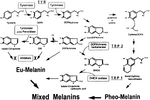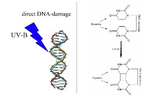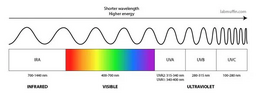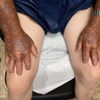The Science of Sunscreen
Disclaimer
I noticed I talk about sunscreen a lot. Instead of repeating myself often, I thought I would just make a post about it that I can link back to. It's a bit of a controversial subject it seems, and so if you don't like or support the usage of sunscreen, this thread is not for you. I'm not here to 'prove' that these things exist in this post, but rather explain how it works. With that being said - I encourage any kind of discussion about sunscreen in the replies. So if you want to talk about the validity of my claims, discuss some disagreements, talk about the science and so on, I'd be happy to do so in the replies.Disclaimer
Explaining UV
To start this off, we first need to explain what UV even is. UV is short for "Ultraviolet" electromagnetic radiation. UV is a type of light that contains more energy than visible light, about 3.1 to 12 electron volts, and the wavelengths of UV is measured at about 10-400 nanometers (nm), so the wavelengths are shorter than visible light as well. For the sake of simplicity, all this means is you can't see it with the human eye and it produces a lot of energy.UVA1, UVA2, UVB and UVC are produced by the sun. UVA1 and UVA2 are going to be simplified to "UVA", UVB will remain as "UVB" and we will not be discussing UVC at all.
UVA and UVB are our main concerns today. The differences of UVA and UVB will have to do with the wavelengths and the energy produced. UVA light has a wavelength of 315-400 nm, with UVB light having the wavelength of 280-315 nm.
Even though UVA is about 95% of the UV light that reaches our skin, we don't feel it like we would with UVB. UVA rays penetrate farther into skin than UVB rays and can penetrate glass.
UVA is more responsible for us tanning, while UVB is more responsible for our sunburns. You're going to be exposed to UVA constantly, whereas UVB rays varies greatly based off of many factors - such as environmental, seasons, time of day, and so on.
UV Effects Everyone
There's a constant argument among people who don't know what they're talking about, whether or not people with darker skin (most often black people but really anyone who's not white) have to worry about UV. The short answer is, obviously yes, they have to worry about it too. Skin color does not determine whether or not you'd get sunburn in general, or 'less so'. For the average person they should not think much about it beyond this point.The problem with mentioning how melanin correlates to UV rays is it's mainly used in a context of why darker skinned people should not 'care' or does not 'need' certain treatment or products. There is some scientific evidence to show that having more epidermal melanin is correlated with a slight reduced UV penetration, but it's almost always brought up in a worthless and meaningless contexts.

First, melanin produced through a process called melanogenesis, where the amino acid tyrosine is oxidized (a change in it's structure) and polymerized (bonded together). Black skin has more eumelanin, which absorbs and scatters more UV radiation before it penetrates the deeper layers of the skin. The primary point of melanin in our bodies, as we currently understand it, is to protect the hypodermis from UV exposure.
So the argument is "so if you have more melanin, that means you have more UV protection". Yeah, I guess this is sorta kinda true. The differences is kind of negligible in the long term, as the increased risks such as your environment, your habits when you're outside such as whether or not you like to stand in shade or not, how often you're exposed, where you are, etc., play bigger roles in how sun and the UV exposure effects you.
Explaining Tanning and Sunburn
As I explained previously, we primarily tan due to UVA. Whether you're getting it from the sun or tanning bed, this is the UV ray you'd be getting the most to tan yourself. UVA darkens existing melanin in the skin through oxidation. It does not increase melanin production (sorry transracials) and it only gives a temporary "cosmetic" tan. Unlike if you had more eumelanin, there's no real protection against sunburn or DNA damage.You can and sometimes will tan from UVB too, though. UVB light actually triggers the melanogenesis process. It will trigger new eumelanin but this is normally temporary. It will last much longer than UVA tanning will, and the skin may not even show the tan until a few days later. Natural skin cell turnover is going to eventually get rid of the UVB tan unless you're constantly exposed to UVB.
 Now, here's the fun and interesting part: Sun burns! Sunburn is caused by UV radiation damaging the DNA in skin cells. Sunburn, in short, is your skin creating a inflammatory response because the tissue is effected by direct DNA damage - which obviously is caused by the UV radiation. Normally when cells' DNA is overly damaged type I cell-death happens - Sunburn is an immune response, which is why the skin peels, hurts, looks red, and sometimes blister if it's a bad burn.
Now, here's the fun and interesting part: Sun burns! Sunburn is caused by UV radiation damaging the DNA in skin cells. Sunburn, in short, is your skin creating a inflammatory response because the tissue is effected by direct DNA damage - which obviously is caused by the UV radiation. Normally when cells' DNA is overly damaged type I cell-death happens - Sunburn is an immune response, which is why the skin peels, hurts, looks red, and sometimes blister if it's a bad burn.As stated before, some people will have more eumelanin, which means they might burn less. So by this understanding, how badly or how often you get sunburn will depend on your skin type. Albino people have the tendency to burn the easiest, light brown skin has a tendency to tan more than burn, and black people have the tendency to burn the least.
Explaining Sunscreen
This YouTuber has explained what and how sunscreen works better than I could. I suggest watching her video. If you don't want to watch it, you can read it here (A). I would be wasting your time trying to explain everything she's already explained, so I won't. However, I will piggy back off of some of the stuff she said.
Sunscreen, in short, turns the energy of the UV wavelengths that hits your skin into a chemical process, essentially converting that UV, and then 'spits' it back out. This is why you need to reapply sunscreen every 2-3 hours, because over time, it breaks down and loses it's effectiveness.
So, now that you understand how it works - What one should you use? SPF 30 works great in most cases, but SPF 50+ is ideal whenever possible. You should put it on your entire body, or at least the parts that's exposed to the sun/UV. Wearing clothes can in most cases protect you from a good portion of UV and might be overkill to apply sunscreen just to put clothes on top of it. Shade alone is not enough to protect you from UV and as stated earlier in the post, UVA can penetrate glass.
There's better guides that can give you recommendations on what kind of sunscreen products you should try, so I won't attempt to do that here, but you should look for sunscreens labeled “broad spectrum". It will mainly come down to the comfort of the product you prefer. How it feels on your skin or if it causes you to break out. The ingredients list. I normally give the advice of 'Try sample/travel sized products whenever possible and see what you think of it before buying a huge bottle of it'.
Most of this was based off of memory, but I did use some references to refresh my memory. Here's the ones I used:
Wong M. How Do Sunscreens Work? The Science. Lab Muffin Beauty Science. January 10, 2021. https://labmuffin.com/how-do-sunscreens-work-the-science-with-video/
Bryan Barron "The Difference Between UVA and UVB Rays" https://www.paulaschoice.com/expert.../the-difference-between-uva-and-uvb-rays.html

 en.wikipedia.org
en.wikipedia.org
Wong M. How Do Sunscreens Work? The Science. Lab Muffin Beauty Science. January 10, 2021. https://labmuffin.com/how-do-sunscreens-work-the-science-with-video/
Bryan Barron "The Difference Between UVA and UVB Rays" https://www.paulaschoice.com/expert.../the-difference-between-uva-and-uvb-rays.html

Ultraviolet - Wikipedia
Last edited:



